September 18, 2014
The Boomtown Rats Return: A Conversation with Bob Geldof, Plus a Chat with Finch’s Nate Barcalow and Lots of Exclusives
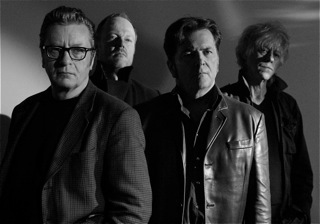
photo courtesy Bob Geldof
A Conversation with Bob Geldof
Mike Ragogna: Bob, I'm honored to be talking to the Man Of Peace.
Bob Geldof: You are indeed honored! [laughs] I'd forgotten I was and now my head has swollen so large the phone can't even fit in this room with me.
MR: [laughs] Bob, let's talk first about The Boomtown Rats performances. You guys are reuniting for a couple of gigs, but do you think it might go beyond New York and Boston?
BG: Nah, we grouped up about a year ago actually for the Isle Of Wight festival which, along with Glastonbury, are the two big festivals here. It was weird, though. Like everybody I said, "I'll never do that." The solo thing I've got going was doing great, I brought out a record called How To Compose Popular Songs That Will Sell or something and it did very well. It got awards and all that stuff and I was touring that. Then two of the Rats came and said, "Look, would you think about doing this?" and I said, "Look, we've talked about this before." If the past is another country it's not one that I wish to visit. I lost my passport a long time ago. You can't revisit old glories; they turn out to be not so glorious really, revisited. But they said, "Look, we've got this offer for the Isle of Wight." The Isle Of Wight isn't where I popped my rock 'n' roll cherry, but I saw Hendrix and The Doors and The Who and Leonard Cohen and all of these amazing people in 1969-70 with hundreds of thousands of others. Suddenly, my vanity was piqued. Playing on that legendary stage--I wasn't going to do that a solo thing. I think the regrouping came about because of vanity, curiosity and cash. The vanity with the Isle of Wight, the curiosity was, "Were we any good? Was that all bulls**t? Was that me shooting off as usual?" And the cash was always handy. I said if it felt like pantomime, if it felt like nostalgia, I wouldn't do it, and they said, "Okay, well let's give it a try."
So we went up to a fan's farm up in Gatwick and we stayed over. The first hour was fucking awful. Then all of a sudden there was this incredible hour--and I'm serious. Just really, "Whoa, what's that?" You don't really know you're a powerful band. You're just a bunch of guys who randomly got together from the neighborhood, you start a band, you're making a racket and you take that racket to wherever you're going to go. But you're not really aware that it's in any way different or how powerful it is, and then after a long, long, long break suddenly you hear this unique group of individuals play together and it's exhilarating. I was used to my solo thing where I'm fairly internal, I wear a cool suit and I play the guitar. Bobby Boomtown is all extrovert. He's the front man. He's an arrogant little prick, and that's me. He was allowed to come out of his sixty year-old self again and it was very liberating and exhilarating. I started singing those words and I didn't need the lyric sheet, I remembered them all. They felt in no way nostalgic. In fact it was much like they'd been words that I was trying to grope for in a contemporary sense inasmuch as that the economic circumstances of eighteen months ago pretty much mirrored 1975, '76 in Ireland. Deep recession, austerity, unemployment chronic for young people.
So why would I alter one line of the first single we did, "Looking After Number One?" The first line you ever heard me say is, "The world owes me a living." Why would I alter that? And "Rat Trap," which I wrote when I was working in an abattoir in Dublin, about hopelessness. I didn't know I was ever going to get out. Why I would I alter a line like that? Two weeks before the rehearsal some other joker in America had killed some of his schoolmates, et cetera. Why would I alter a line of "I Don't Like Mondays?" "Someone's Looking At You," I wrote that in 1979; we'd just been reading about the NSA and Obama spying on everybody, rifling our emails, logging our f**king text messages, the CCTV cameras everywhere, Facebook mining your brain and trying to figure out who and what you are and selling that and here's a song of paranoia written in 1980; why would I alter that? Suddenly all of it, the sound and the lyrics sounded like they should be sung now. So we went out the Isle Of Wight, the others were very nervous, I wasn't because I'd just done three very big gigs in Germany with a solo band and a fourth gig in the Rose on the Isle of Wight. But there was a lot of people. We walked out on the stage and we f**king killed it. That's the truth. It's boasting, but we nailed it. I was a completely different person from the day before in Germany and on that stage I thought, "How do I get back to Boomtown Bob? Where is he living these days?" I thought, "I know, I've got a f**king snakeskin suit made. That'll bring him out." So I got this full snakeskin suit, it's really cool. Bobby Boomtown came slithering out on that stage f**king screaming and shouting again. I loved it. My voice is croaking because yesterday we did a festival in Cornwall. We've just done fourteen or fifteen festivals in the summer and we did a sell out tour in the winter and we're just going to do another sixteen dates in the cities we didn't do in the UK in October/November. New York and Boston, fantastic, I haven't played in America since God knows when, I hope three people will show up but I'll play for those three people.
MR: [laughs] I doubt it will only be three people! You've participated or energized many fundraising and awareness raising efforts such as Band Aid, Live Aid and The Secret Policeman's Ball. It must be at least a little frustrating that after all these years, some themes that The Boomtown Rats called out are still relevant.
BG: Well, it's a good point. The first thing is you forget that the punks came at a time of political and economic despair. There was no joking about The Clash or The Sex Pistols or The Ramones or Talking Heads or Elvis Costello. Not so much the American ones, but the British ones were kids with clear political intent to change. Johnny Rotten saying, "There is no future in England's dreaming," it's a fantastically astute line. The Clash made no bones about where they were at and the Rats came with, "You owe me a f**king living, I'm not going to be like you. We made this thing." From there to using the promise of rock 'n' roll, whether it's embodied in Elvis and Little Richard and them telling you, "Poor black boy, we're coming. You can f**k off. We want in on this thing and we're coming," down to the sixties bands and down to the seventies, that was it. The middle of the "me" generation and the middle of Gordon Gekko and the Yuppies and all of that this spaceship called Live Aid lands in the middle of it saying, "Well, no, it's not just about me. It can be about me, but 'me' only exists through the forbearance of others." That was a sort of shock to the system, which had wonderful reverberations. That's the musical content, but the person--I was always interested in that kind of s**t because I'm a sixties kid.
So Bob Dylan and Mick and Keith and John were always telling me it's about this other stuff. "Read this, look at this..." It's not about Mick and Keith, it's about Howlin' Wolf and Muddy Waters, "Okay, I'll listen to that, but what the f**k is that? Muddy Waters? Howlin' Wolf? Are they people or are they some elemental force?" In fact they're both and they make music. Those were the things that alerted you. So I kept making music but also on the other hand taking the lobby that Live Aid generated to 2005 and Live 8, and bringing other people along the way with me. So it's a long journey. If you want actual change you can't just write a tune or play it; you must engage with the agents of change, and the agents of change in our world are politicians, and that's slower. So you have to build up the lobby and keep it going until you eventually get political closure, which we did out of the G8 in Gleneagles Hotel in 2005, and the result was that today with the cancellation of deaths, with the doubling of aid, with massive Chinese inward investment to Africa and the device that glued all of that together, the mobile phone in the largest market in the world, Africa, suddenly you had take off and today seven of the top ten fastest-growing economies in the world are African. Sometimes s**t works.
MR: Does that make you want to work even harder to get more projects going?
BG: Well you sort of have to corral the outreach to the focus-pointed end or else it becomes dissipated. I don't think that rock 'n' roll has got the central function in our culture that it had in the past. In fact, we know it doesn't. Now the biggest bands in the world have to give away their records. We have become the McCluhan-esque society; the medium is the message now. The content of the medium is irrelevant. You give it away for free even though that's the human genius. The human ingenuity is the device. It's a very clever device, a little piece of brilliance, but that's how you identify yourself these days. In my day, it was going swanning around with my new Blonde On Blonde album. Now it's flashing your iPhone 5. The actual medium, literally, is the message these days. That's sad, and it means that you're less able to communicate as you were, and as a result you do get this dissipation you talked about, it's acute of you to recognize that. My view is that the distribution of the media has meant the dissipation of the message.
MR: Bob, what advice do you have for new artists?
BG: Well, famously, when John Lennon showed up in New York one of the journalists said, "What's the Beatles' message?" and John said, "The Beatles don't have a message, but if they did, it would be 'learn to swim.'" Which is absolutely meaningless, but frankly in the days of climate change it takes up a whole new resonance. I think they've got lesser ambition--that's my view. My daughters' boyfriends are in bands, and they're fantastic bands. Let me be clear: I don't think the music is any less adventurous, any less galvanizing, any less exciting. Peaches' husband is a great singer writing properly great songs. Pixie's boyfriend is a drummer in an amazing band called These New Puritans, beautiful, beautiful music. I go to their gigs and I'm able to talk to these guys who hang with my daughters but get into deep conversations and they're just as impassioned as before and they want to strike out and do new things. This little minor art form, rock 'n' roll, allows you to be endlessly elastic. But where does it go? Who's listening? Who's paying attention? It doesn't have to be about anything. Just by definition rock 'n' roll suggests change. It always does. That's why it's powerful. Of course when it goes to number one it's a bit more powerful, but nowadays a number one record is meaningless. How many tracks do you have to sell to get there? I just think it has a different function now. In a way you can argue that that culture succeeded because of its ubiquity, but conversely because of its ubiquity it's failed. That's sad, but there will be something else. There will be a Sistine Chapel of the web, we just have no idea what it will be.
MR: Wow. Nicely said. What are you going to be working on now?
BG: Well I do lots of stuff, obviously the solo band, and I've got a couple of gigs, The Bobkatz, we're doing some gigs, I've got the tour with the Rats coming up, there's all the political stuff I do, I work with Kofi Annan and Bob Rubin and Muhammad Yunus and guys like that on the Africa Progress Panel. I obviously work with Bono and the One Campaign, I have a private equity group for investment in Africa which is very exciting because the next thing is to create jobs. Talking to all the funds I've invested in Africa I've actually decided to do it myself as a way to show that this continent is open for business. I go down there quite a lot and it's fantastically exciting. Then I do quite a lot of business in the UK, media stuff and education technology stuff I have here. I don't know what the f**k I'll do next.
MR: [laughs] What a great way to end that. It seems like every year, you receive and award. What was 2014's?
BG: There's a really cool one coming up, it's October tenth. Our equivalent of the Grammys is the Ivor Novello awards. I think the Grammys are voted on like the Oscar academy, the Ivor Novellos are voted on by other songwriters. If you get an Ivor Novello really, you talk to any British artist that's the one that they like. That's the one that they put on their mantelpiece. It looks like a Henry Moore statuette, it's really heavy and it signifies something. But the academy that votes on that is called BASCA, which is the British Academy of Songwriters, Composers and Authors. When a body of work has been accrued, if it's stood the test of time you get their golden badge. They're giving me their golden badge this year. This is the fiftieth golden badge given out, which is very cool because not many people have it obviously. I think Sting has it, which pissed me off--he's got f**king everything. He's got nine hundred Ivor Novellos and three thousand Grammys, it really annoys me, you know? So I'm getting that, I'm really glad about that. I really don't think about Live Aid, that pride thing doesn't interest me, but what I am is a musician, so stuff like that does my head in. I'm thrilled to get that. Really thrilled.
MR: Do you take a moment to take a breath and see, "Wow, would you look at all that..."
BG: That's really a very good question. I do. And I ask my contemporaries, "What the f**k happened to me?" Because in my head always, last week I was on the dough queue in Dún Laoghaire, pissing rain trying to get my benefits--whatever you call them in America, my money--and trying to get any job they'd give me. That was last week. That's it, I can't escape it. I walked out with Sting one summer's morning in his unbelievably beautiful place in Wiltshire. We walked out to the lake and I looked back at his house and I said, "Man, what happened to us?" and he said, "I don't f**king know." He's two days older than me, so he always behaves like my big f**king brother. It really annoys me. He said, "I don't know. Every day I'm delivering that milk with my trolley." It's weird, but you never escape it. Unfortunately. I wish it could all sit easy with me, but it doesn't. But that's the thing that propels you on stage every night. That's the thing that drives you to that righteous anger that you hear in the music of The Boomtown Rats.
PERFORMANCE DATES
TERMINAL 5 IN NYC SEPTEMBER 26
THE ROYALE IN BOSTON SEPTEMBER 28
Transcribed by Galen Hawthorne
*****
CHETTI'S "#MADEINBKLYN"

According to the Chetti camp...
"Brooklyn-bred singer and songwriter Chetti has just released her EP In the City on iTunes and Spotify, and is already poised to do much much more. The 23-year-old started out immersed in musical theatre - she attended Wagner College's Theatre Performance program where she worked directly with Tony Award Winning actress Michele Pawk and many other esteemed theatre professionals, but not long after graduation, she shifted her focus toward writing music, which, turns out, she's really good at. Chetti was a featured artist on Chipotle's Farmed and Dangerous mini series, and also wrote the song 'Burn' for the soundtrack.
"Her catchy brand of pop/R&B will stick in your head for days, but the songs have a deeper meaning underneath the fun head-bopping and dance-inducing rhythms - Chetti's core purpose is to lift people up with her music, but she's also intent on sending a message of positivity to her fans, especially to other young women."
Check out her latest track #MADEINBKLYN below, about her hometown.
She's also made a video for the EP's title track "In the City," which was shot in her neighborhood, with her friends and family. Check out a mini tour of Chetti's Brooklyn here:
*****
THE UGLY CLUB'S "PASSENGERS"
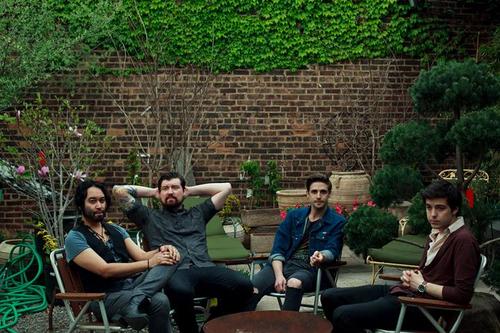
photo credit: David Worthington
According to co-conspirator Ryan Egan...
"This video was a long-awaited project between the band and our good friend Chris O'Konski (Billboard Music, Balcony TV Brooklyn). Chris is a freelance videographer and director and we brainstormed this video for months. Eventually, we collaborated on writing, directing and producing it while Chris shot and edited every second of footage. We attempted to make an eerie, dream-like story with me finding all my band members zombie'd out in this unknown place, to compliment this dark, dancey pop song. We did a lot of ambient, cool shots and even pulled some influence from Gus Van Sant and other favorites. The whole experience was super DIY and just unbelievably rewarding."
Directed, Produced, & Written by Chris O'Konski & Ryan Egan
Edit - Chris O'Konski
D.o.P - Chris O'Konski
*****
SHARON BOUSQUET'S "LOVE HAS DRAWN A DOOR"
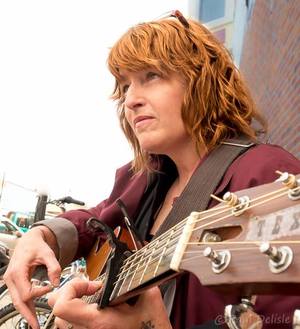
photo credit: Paul Delisle
Sharon Bousquet is a powerful singer-songwriter who's built a fan base from Colorado and Texas to the Midwest. Check out her original song "Love Has Drawn A Door" that she performs with the group All Souls On Deck.
*****
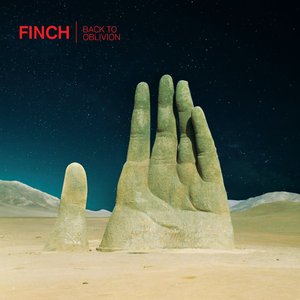
A Conversation with Finch's Nate Barcalow
Mike Ragogna: Back To Oblivion is the title to your new album. It's been nine years since your last intended studio album, so that title seems a bit ominous considering the band's breakups and reformations, no?
Nate Barcalow: It's a little deeper than that. As we were writing the record, the word oblivion would become synonymous with hope. The hope that things can get better no matter what the situation may be. "If the doors of perception were cleansed everything would appear to man as it is, infinite. For man has closed himself up, till he sees all things through narrow chinks of his cavern." - William Blake
MR: What have you and the gang been doing since the last project?
NB: We all kind of started doing our own thing. I started a band called Reverend Crow that I play guitar and sing in, which is still active and I am very excited about. We have an e.p. available on iTunes.
MR: What was the reunion like and how did the band create and record the new material?
NB: The reunion was a lot of fun. After stepping out of the scene for a while we had the unique opportunity to go back out as a band and play What It Is To Burn in its entirety for our fans. I think everyone involved in the experience, both band and fans, realized they were a part of something special. After the tour ended we were in a very positive place mentally, and I think we took that energy and headed straight into writing new material that, at the time, we did not realize would become the third Finch record in nine years.
MR: Were there any surprises that happened during the process?
NB: I was surprised how challenging the process actually was. There is a lot of work that goes into making a record and since we hadn't done it in so many years, I guess I forgot that it takes time and a substantial amount of focus.
MR: Are there any tracks that you're particularly fond of now that the album is completed?
NB: One of my favorite tracks on the new record is Play Dead. It is a dark track through the mud narrated by a man who has had "enough" and has found a way to transform himself into something greater while trying to lead others out of the swamp, figuratively speaking.
MR: What do you think Finch's major musical contributions to music, and I guess that would include the hardcore scene, right?
NB: I never considered ourselves a hardcore band. We are just a band. Whatever we may contribute to any scene is never intentional, we just play what we play and if that inspires other people, then that is a positive impact.
MR: In your opinion, who are your contemporaries and do you guys listen to any of them for enjoyment?
NB: There were slew of bands coming up alongside of us when we started on Drive Thru records. It was an exciting time for us because we were just starting out and we were so young. I guess the only band that I still listen to from that era would be the RX Bandits. They are an extremely talented and inspiring band and very wonderful people.
MR: What advice do you have for new artists?
NB: Never give up and never give in.
MR: What's the best advice ever given to you?
NB: I saw a line written on a wall once that said: "Stay True To Your Music." It has always stuck with me and I think it works on many different levels.
MR: What are Finch's future plans?
NB: "The future's not set. There is no fate but what we make for ourselves."
*****
THE GLASS CHILD'S "WHO AM I"

photo credit: Maxime Imbert
According to Charlotte Eriksson (The Glass Child)...
"I wrote this song by the river in London one night two summers ago. It was a typical July night and I'd spent the last couple of months wandering in England. No belongings but a worn out bag and my guitar, crashing at friends' and fans' couches, trying to find my way. The song became my own mantra for staying on my path. To not give up and to keep on going, even though it's hard and dark. If you find something you feel like you're supposed to to do, your only mission is to walk your walk."
*****
MAIA & THE PILOTS BRING "HOME"
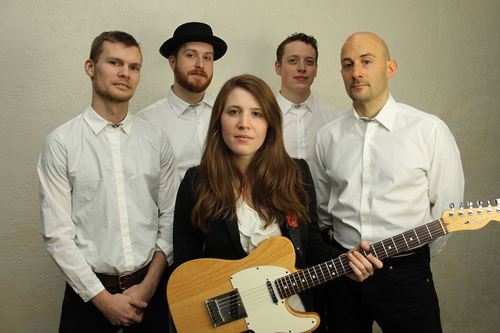
photo credit: Janis Wilkins
According to Maia Pillot...
"I'm originally from New York but was living among the cornfields of Iowa for a few years. While I was there, I kept thinking, 'Why would anyone move to New York? It's so calm, beautiful, and idyllic here in the heartland.' After a few years, some opportunities presented themselves and I ended up moving back to New York, begrudgingly. So I started writing a sarcastic song about the city I grew up in. But once I got back I realized how much I really do love this place; that it's home, and there's absolutely no place like it. I can take a 15-minute walk and smell the cuisines of ten different nationalities, hear seventeen languages being spoken. There's even a mosque right nearby a kosher deli, both of which have been there for years without a problem. My feelings about New York came full circle. And the song evolved along with that rediscovery. 'Home' doesn't have to be the place where you grew up, but rather the place you gravitate towards. For me, though, they're one and the same."
*****
"AUSSIE" BY EXQUISITE RAP DUO FEATURING CROCODILE TONY (IGGY AZALEA'S "FANCY" PARODY)
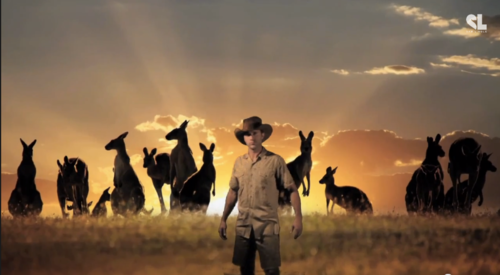
photo credit: Sam Lingle
According to the Exquisite Rap Duo gang...
"When American rappers Exquisite Rap Duo first heard 'Fancy' on the radio, they were wondering who this new black female rapper from the Brooklyn was - they liked her flow. When they found out it was a white Australian girl they lost it. So they decided to fight back against the absurd commodification of hip-hop - where now corporations are so bold they'll take a pretty girl from Australia and have her use a fake Brooklyn accent to rap like about American street life. Enter Crocodile Tony. 'Aussie' is the ultimate parody, an American rapper using a fake Australian accent to rap about all things Australian. It is both brilliant and hilarious. Long live Crocodile Tony. Sorry Iggy Azalea, you got owned."
